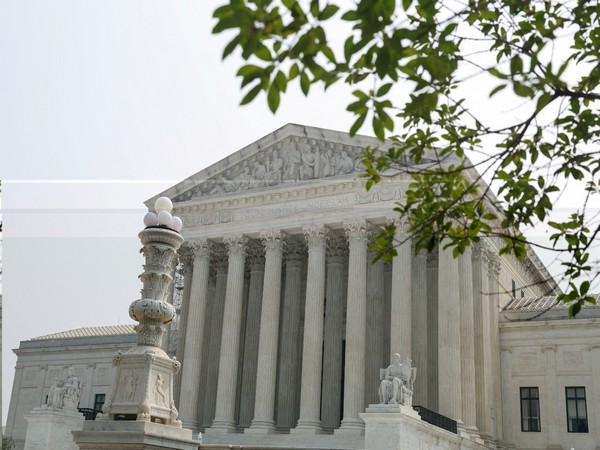Washington DC [US], November 14: The US Supreme Court issued an ethics code on Monday amid mounting pressure over reports of undisclosed property deals and gifts.
In a statement, the justices said they had established the code of conduct “to set out succinctly and gather in one place the ethics rules and principles that guide the conduct of the members of the court.”
However, it was left unclear how the rules would be enforced, and the court said that it was still studying how any code would be put into effect.
“For the most part these rules and principles are not new,” the court said, adding that “the absence of a code, however, has led in recent years to the misunderstanding that the justices of this court, unlike all other jurists in this country, regard themselves as unrestricted by any ethics rules.”
According to the New York Times, the revelations of lavish vacations and high-end gifts have cast a light on how few ethics rules bind the justices, but under the new code, it remains unclear which of those activities would violate the rules — and who would decide.
The code, laid out over nine pages, does not place specific restrictions on gifts, travel or real estate deals.
But it does caution the justices that they should not take part in outside activities that “detract from the dignity of the justice’s office,” “interfere with the performance of the justice’s official duties,” “reflect adversely on the justice’s impartiality” or “lead to frequent disqualification.”
The new rules also prohibit justices from allowing “family, social, political, financial or other relationships to influence official conduct or judgment.” The document cites examples of when justices must recuse themselves from a case, including when they have a “personal bias” or a financial interest, the New York Times reported.
Meanwhile, the experts in legal ethics have given only ‘measured approval’ to the document.
“This is a small but significant step in the right direction,” said Amanda Frost, a law professor at the University of Virginia. But she said she was troubled by the court’s failure to acknowledge past transgressions and the lack of a mechanism to enforce the new restrictions.
Daniel Epps, a law professor at Washington University in St Louis, said the new code reflected, if nothing else, a recognition that the court had to act.
“It’s good that they did this,” he said. “It’s good that they feel some obligation to respond to public criticism and act like they care,” adding “in terms of the content, it doesn’t seem to move the ball much.”
The main difference between the new code and the one that applies to other federal judges is in its treatment of recusal. In commentary the court issued along with the code, the justices said they must be wary of disqualifying themselves from cases because — unlike judges on lower courts — they cannot be replaced when they do.
“Because of the broad scope of the cases that come before the Supreme Court and the nationwide impact of its decisions,” the commentary said, the provision on recusal “should be construed narrowly.”
In recent months, a few justices, including Elena Kagan, Brett M. Kavanaugh and Amy Coney Barrett, publicly voiced support for an ethics policy, the New York Times reported.
Debate over whether the court should be bound by an ethics code has persisted for years. Calls for the court to adopt a code intensified after revelations that raised questions about potential conflicts of interest.
In April, ProPublica documented the justice’s years of undisclosed luxury travel, including private jets and trips aboard a superyacht at the largess of a Texas real estate magnate and conservative donor, Harlan Crow.
The code bars the justices from speaking at events that promote commercial products or services, but it includes an exception for events to sell books by the justices. Book deals, some in the millions of dollars, can be highly lucrative for the justices, and in some instances, employees of the court have helped research and promote the books, New York Times reported.
The rules also prohibit justices from being “a speaker, a guest of honor or featured on the program” of a “fund-raising event.” The code defines a fund-raising event as one in which the “proceeds from the event exceed its costs or if donations are solicited in connection with the event.”








































